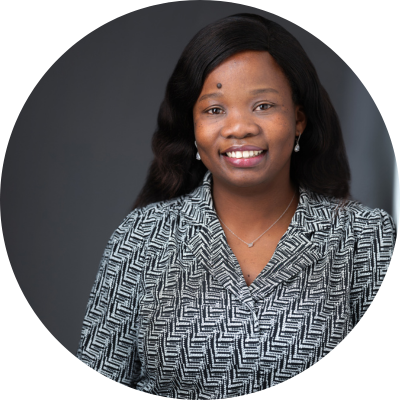Elizabeth Onyango, assistant professor in the School of Public Health, is addressing the issue of food insecurity that many diverse ethno-cultural immigrant communities in Canada are facing.
In this week’s spotlight, hear from Elizabeth as she discusses cultural food security and her work in empowering immigrants, including generating evidence to promote engagement in collective community gardening.
How do you describe your work to people who don’t work in your field?
I am a community-based health and well-being researcher who is deeply committed to working with immigrant communities to address social and health inequalities related to food insecurity, gender issues and the associated health outcomes. In working alongside immigrant communities and immigrant serving agencies, my interest is in empowering immigrants and their families to enhance health and sustain community well-being. I do so by generating evidence to promote engagement in collective community gardening to support social connection, mental health and well-being, knowledge exchange and local production of culturally familiar vegetables and fruits.
What’s one big problem you want to solve through your work?
Food insecurity is an ongoing reality and a public health issue affecting the many diverse ethno-cultural immigrant communities in Canada. An aspect of food security that is less often talked about is cultural food security. Cultural food security, that is being able to acquire, afford, and eat traditional foods of one’s ethnic origin is an important aspect of integration and meeting the health and nutritional needs of oneself and/or one's family. By continuing to practice one's food traditions and customs, we foster cultural identity and societal connections. Doing so also creates spaces for learning and building cultural humility and safety not only for immigrants but also for the mainstream Canadian population.
I see my work contributing towards addressing these aspects of food security by providing evidence for the diversification of Canadian food systems to meet the food needs of newcomers to Canada while also creating spaces for socio-cultural knowledge exchange and mental well-being support.
What does the word “innovation” mean to you?
To me, innovation refers to new ways of thinking, of doing things, and of engaging with people to address real-life issues such as food insecurity. It is about challenging conventional thinking and seeking unique approaches to addressing social and health inequalities between and amongst the human races for the betterment of current and future generations. It is about exploring the impossibilities, and the possibility of locally producing a variety of food and food products that address the needs of the diversifying Canadian population. It is about trying out tropical vegetables and foods to address the food security needs of the different ethno-cultural communities in Canada.
What’s been your biggest a-ha moment — in life or work — so far?
My most important realization to date is that in life, the greatest power is the power to choose and that this power is limited by factors external to the individual. Reflecting on my life as a young girl born and raised in a rural community in Western Kenya, access to education was and remains a privilege to some. Not everyone has the power to choose to attend or not to attend school. Revisiting some of the storytelling moments shared with my mother, I remember her talking about how sad it was for her to drop out of school at the command of her dad, my grandfather, who never thought that it was worth investing in a girl’s education. That choice paved a trajectory for her life but also acted as a motivation for her to be the best cheerleader not only to her daughters but also to other girls in our community.
Having been raised by such a powerful social equity advocate coupled with my lived experiences, my biggest impetus today is to work alongside marginalized groups with the goal of empowering them to increase their power to choose. I do this by engaging in policy-oriented research that addresses the systems of power which often limit the power of others to make the best choices.
How do you or your team come up with your best ideas?
Being new to my position at the School of Public Health, University of Alberta, it seems to me that there is so much trial and error that I am still going through with my new research team. However, the option that has proven to work best for my team is the small group brainstorming both with my students and colleagues in diverse areas of research. The formal and informal ideation process has been quite helpful and has led to the creation of most of our current research projects. We also rely heavily on existing literature and together with my team, we are engaged in some systematic and scoping reviews that continue to inform our work.
What’s your favourite thing about working at the U of A?
The University of Alberta offers numerous opportunities to engage in meaningful community-based research which is an area that I am passionate about. With a well-established foundation for community service and a good reputation, the U of A continues to provide a suitable environment for me to work in the community. Additionally, the university has a great team of employees including the academic and non-academic staff that make it enjoyable to be part of the U of A community. Since joining the university, I have received tremendous support that has allowed me to accomplish some of my career goals that once seemed impossible or unreachable.
I am particularly indebted to the unwavering support I continue to receive from my colleagues and mentors Drs. Mary Beckie, Susan Chatwood, Denise Spitzer, Dunsi Strohschein, and Bukola Salami. They have sincerely made my experience as a new assistant professor at U of A, and more so as a person of colour, exceptionally rewarding.
Drs. Mary Beckie, Denise Spitzer and Susan Chatwood have been instrumental in providing the much-needed guidance and support in my teaching, research, and student mentorship. Dr. Dunsi has helped connect me with community members and organizations in Edmonton and Alberta at large. Dr. Salami has played a key role in most of my research projects and most recently, she introduced me to larger research collaborative projects, the Canada First Research Excellence Fund (CFREF) - Bridging Divide project. This is a research program dedicated to exploring the challenges and opportunities that migrants pose for Canada. I submitted a proposal idea to this collaborative which has been funded and together with my team, we are beginning the implementation of the research project.
Do you have a role model at the U of A? How have they influenced you?
Dr. Bukola Salami, who recently moved to the University of Calgary, is my role model. I first met Dr. Salami during my first year of postdoctoral fellowship with the Hungry Cities Partnership at the Balsillie School of International Affairs and Wilfrid Laurier University. At that time, one of my mentors, Dr. Funke Oba invited me to join the Black Women Academics in Conversation and Dr. Salami was part of the group. She talked passionately about her work on migration and the health of immigrants, a research area that I was and remains passionate about. We connected at that point and my coming to U of A strengthened the mentorship relationship.
In Shape: The University Strategic Plan 2023-2033, the University of Alberta commits to having a positive impact on our students and staff, our communities, and the communities we serve here in Alberta and around the world. What are the impacts of your work?
Over the past one and a half years of being at the University of Alberta, my work has contributed in diverse ways to the university’s commitment to having a positive impact on communities within and outside the university. I have deliberately reached out to local agencies including the city governments to identify relevant community and city-based research opportunities. Currently, I am working alongside the Cities of Edmonton and Calgary and other immigrant service organizations (Multicultural Health Brokers Co Op and Sinkunia Community Development Organization) to explore barriers and facilitators of engagement of Black identifying immigrants in food security initiatives in Alberta.
Additionally, my research team is collaborating with Women and Gender Equality (WAGE) - Canada to explore culturally relevant interventions for the development of alternative masculinities to promote gender equitable behaviour among Canadian immigrant communities. These research projects are proposing socio-culturally relevant policies for addressing food insecurity and gender-based violence among immigrant communities in Alberta and Canada at large.
As an immigrant to Canada with both local and international connections with academic and research institutions, I endeavour to create new partnerships and collaborations with individuals and institutions in and outside Canada. For example, my research team is currently working on a new collaboration with MiFOOD Research Project at Wilfrid Laurier University in Ontario, Canada. MiFOOD Project is a SSHRC-IG-funded project that aims to design and implement new and innovative high-impact global research and knowledge mobilization focused on the neglected interactions between migration and food security in the Global South. Through this collaboration, one of my graduate students will be implementing a research project on a gendered analysis of the role of women-led informal food businesses in urban household food security and the well-being of urban dwellers in Kisumu City in Kenya. In this project, we are collaborating with Maseno University, the University of Nairobi, the Pamoja Community-Based organization, and the County Government of Kisumu, Kenya.
Furthermore, I am intentionally recruiting local immigrant and international graduate students that I am mentoring in my research program. The trainees are gaining hands-on experience in critical interdisciplinary and community-based research for addressing social inequalities and injustices related to food security and gender-related issues. These are important skills for current and future public health professionals in Canada and abroad.
What’s next for you? Do you have any new projects on the horizon?
My research team is starting a new collaborative project on community gardening for cultural food security, mental well-being, and knowledge exchange among newcomer youth and seniors in Canada. The project investigates the experiences of these high-risk groups of mental health, food insecurity and the services that address these social determinants but with a special interest in exploring how community gardens can be utilized as places to support land-based and intergenerational mental health and food security support services. The study is part of the CFREF - Bridging Divides collaborative project funded by the Canadian Government of Toronto Metropolitan University.
Additionally, my research team is also beginning to implement a SSHRC Insight Development Grant on the engagement of African immigrants in municipal and community initiatives for food secure Alberta. The project contributes knowledge on the cultural relevance of policy and strategies necessary for addressing food insecurity challenges in Black-identifying communities in Alberta. This research is of relevance not only to Alberta but more broadly to Canada’s current and future sustainable economic and social growth by ensuring the cultural relevance of such initiatives to the food needs of African Canadians.

